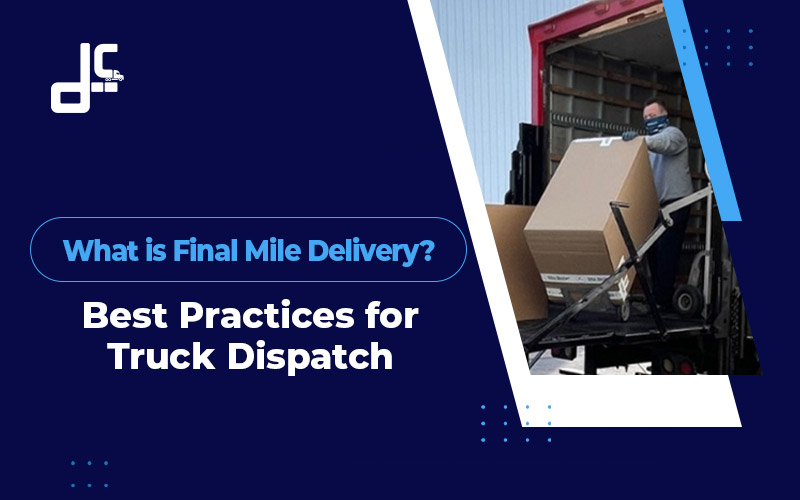Consumers these days expect fast and reliable deliveries. Final mile delivery, also called ‘last mile delivery,’ is the last leg of the overall delivery process. It is when the shipment is transported from a distribution center to its final destination. It is the final phase that decides the satisfaction and loyalty of all entities involved in this process. Therefore, it becomes essential for dispatch service providers to adopt the best practices in their last-mile deliveries. This blog will help us understand more about last-mile deliveries, their challenges, and the best practices to adopt.
What is Final Mile Delivery?
Did you know that over 50% of total shipping costs relate to last-mile delivery? Last-mile or final-mile delivery is the most expensive and time-consuming part of the dispatching process. It ensures the efficient delivery of goods to your destination. Last-mile delivery is an enabler of growth and a competitive factor for many businesses, as the final leg of the dispatching process comes with more fuel expenses, labor costs, driving time, and other complexities. It is the most essential aspect of dispatching that decides the success of a business in terms of shipper loyalty.
What Are The Associated Challenges in Final Mile Delivery?
As a final mile delivery is often seen as a time-consuming and costly process, it involves several associated challenges. These associated challenges are high costs, traffic congestion, unpredictability, accurate time tracking, and lack of technological integration. Let us understand these challenges one by one.
1 . High Costs
The high costs account for related labor, fuel, and delivery equipment costs. The cost of hiring truckers as per delivery times, the cost of hiring human resources for last-mile delivery management, etc. Then comes the fuel costs, which generally rise when you deliver your goods to new areas and shipment receivers. The next factor is the cost of equipment that ensures the security of goods in last-mile deliveries.
2. Traffic Congestion
Traffic congestion is a common problem in urban areas. Traffic jams, parking issues, and regulatory restrictions lead to an interruption in last-mile deliveries. If you tend to face heavy traffic jams or restrictions on operating at certain hours, it can pose a challenge against a smooth final mile delivery.
3. Unpredictability
There can come unpredictable instances, such as same-day delivery not being possible or failed/late deliveries. In such a case, the shippers get unsatisfied and can think of finding some other truck dispatch service. Or it can be the opposite case when the shipper asks for last-minute changes or cancellations. Such instances pose a big challenge for last-mile deliveries.
4. Real-time tracking
Another challenge for inefficient last-mile delivery is the lack of accurate time tracking and communication. If there is no or lack of real-time communication between the dispatchers, truckers, and shippers, it significantly leads to delays and errors.
5. Lack of Technological Integration
Dispatch service-providing companies that are still not adopting the latest technologies will likely face challenges in last-mile deliveries. Thus, you must integrate technology such as GPS tracking and delivery management that makes the process smooth.
What Are The Best Practices for Truck Dispatch for Efficient final mile delivery
Adopting some of the best practices becomes essential after having a fair idea about the associated challenges in final mile delivery. Here is a list of the best practices to adopt for truck dispatch to ensure efficient final-mile delivery.
1. Advanced Truck Route Planning
Advanced truck route planning helps optimize routes according to distance, road restrictions, weight limits, and traffic. These calculated factors help plan routes and group deliveries, thus transforming operations.
2. Real-Time Tracking and Communication
Real-time tracking and communication in the supply chain process are essential as they help track each move. GPS tracking, for instance, enables the dispatchers to monitor vehicle location. Moreover, real-time tracking offers enhanced visibility to truck drivers and shippers, allowing them to stay updated about the shipments in real-time. This, in turn, helps build trust amongst all entities involved in the dispatch process.
3. Trucker and Shipper Communication
Transparent communication between truckers and shippers is essential for ensuring an efficient last-mile delivery. It is crucial for truck dispatch services to foster a sense of accountability with their shippers and trucking companies to build more trust.
4. Adopting Latest Technology
Adopting the latest technologies, such as Delivery Management Systems (DMS), GPS, and others, can enhance the final mile delivery process. These technologies help automate the processes, thus improving efficiency.
5. Make Use of Data Analytics
Data analytics lets you gather valuable insights and optimize the last delivery operations. Any mishap or problem can occur at any moment, and data analytics is a way to predict such things beforehand. Moreover, the data insight lets you improve operations in last-mile deliveries and other related operations.
Conclusion
Final mile delivery is an essential aspect of the logistics process and comes with its own set of challenges. However, you can minimize the challenges by adopting some best practices. These include route planning, leveraging technology, customer communication, and training truckers. Now that you are aware of such practices, it is better to adopt them so that you do not face the everyday challenges of final mile deliveries.
